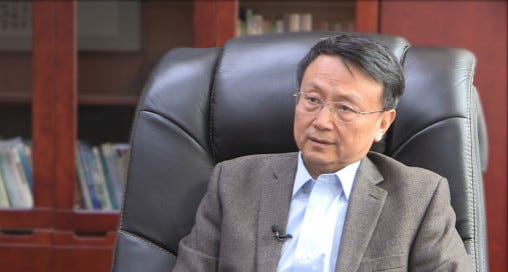Jia Qingguo calls on Beijing to relax control to encourage non-govt efforts to tell China's story
Renowned PKU International Relations professor and Standing Committee member of CPPCC National Committee shares his proposal to ongoing CPPCC session.
The annual sessions of the National Committee of the 11th National Committee of the Chinese People’s Political Consultative Conference(CPPCC) and the 11th National People's Congress are ongoing in Beijing.
Jia Qingguo, Member of the Standing Committee of the 11th National Committee of the CPPCC, Professor of the School of International Studies at Peking University, and Director of the Institute for Global Cooperation and Understanding (iGCU) of Peking University, publicly shared one of his two proposals to the session today. Jia was the Former Dean of the School of International Studies at Peking University.
The proposal was published in the WeChat blog of iGCU.
(All the highlights are mine - Zichen Wang.)
贾庆国:关于鼓励民间对外讲好中国故事工作的提案
Jia Qingguo: Proposal on encouraging non-govt efforts to effectively tell China's story
General Secretary Xi Jinping emphasized that telling China's story well, spreading China's voice, and presenting a true, multidimensional, and comprehensive image of China, is a crucial task in enhancing our country's international communication capabilities. Over the years, the nation has invested considerable resources in this area, accomplished much work, and achieved quite many successes. However, there is still significant room for improvement in terms of effectiveness. For instance, in recent years, the favorable perception of China among the populace of some countries has not increased but decreased. A Pew survey conducted last year revealed that in many countries surveyed, negative views of China reached a 20-year peak, with significant declines in countries around China, such as Japan, South Korea, and India. Although the survey results may not be entirely objective and accurate, they reflect that there are indeed issues in this regard.
The reasons for this situation are both external and internal. Externally, there are inaccurate reports or even defamation and smearing by media in the United States and Western countries. Internally, many areas in our foreign relations work need improvement. We cannot expect other countries to change this situation; we can only improve by enhancing our own efforts.
Currently, at least three factors hinder our ability to effectively tell China's story abroad: First, there are misconceptions, such as some people believing that telling China's story is less tangible than economic or defense development, or that it is the government's responsibility alone, or that the public does not understand the government's policies and actions, leading to inconsistent or even incorrect expressions of views. These misconceptions result in some leaders not valuing or prioritizing public participation in telling China's story.
Second, there is significant room for optimization in managing foreign interactions which hinder the function of non-governmental energy and capacitilities. There are excessive restrictions on scholars and retired officials traveling abroad, participating in international conferences, giving interviews, or meeting foreign diplomats in China, especially regarding interviews with foreign journalists, which are rarely approved. This has led to a decrease in public statements abroad, causing China's voice to be "lost" and its image to be "distorted" internationally.
Third, higher authorities lack incentives for performance and tolerance for mistakes in subordinate units. If a leader approves foreign engagement activities that are effective and problem-free hundreds of times, they receive no praise. However, if a problem occurs once, they are held responsible. Consequently, leaders may choose to approve fewer or no activities to avoid risks.
At a time of profound changes unseen in a century, with the world highly interested in China's rise and eager to understand Chinese ideas and perspectives, the reduction of China's voice not only fails to clarify China's stance and viewpoints timely but also fails to refute and correct the smearing and defamation of China, exacerbating negative views of China abroad. This situation demands our attention and effective response.
Therefore, the following suggestions are proposed:
1. Raise awareness. First, it is crucial to study General Secretary Xi Jinping's speeches on telling China's story well, fully recognizing its importance in enhancing China's soft power and creating a peaceful development environment externally in the New Era. It is necessary to understand the importance of public participation: official resources are limited, and many issues cannot be thoroughly addressed by official statements, which are often seen as mere propaganda. Non-government expression can complement these areas. Despite differing public opinions, as long as people speak out, the combined effect will contribute positively to the external world's objective understanding of China. The government can improve the quality and effectiveness of public expression by explaining policies and situations to those frequently involved in non-government exchanges.
2. Reduce the numerous restrictions on public and track-two diplomatic exchanges. Implement differentiated management for experts and scholars engaging in foreign engagements, with strict approval processes for a minority who hold leadership positions and frequently deal with confidential information, and a filing system for others where the requirements for approvals are eliminated.
3. Adjust current policies to encourage retired officials, especially in diplomacy and related fields, to participate in foreign engagement activities. They understand policies, are disciplined, have extensive foreign affairs experience and an international audience, and are influential abroad, thus playing a positive role.
4. Protect leaders responsible for foreign affairs in organizations to perform their duties according to the law and regulations. The more foreign engagements occur, the higher the probability of incidents. If problems are immediately punished, it will inevitably restrict foreign engagements. Therefore, reasonable and clear approval standards should be established, and responsibility for problems in approved foreign engagements activities should fall on the relevant individuals, not the approvers. (Enditem)
Ex-govt spokesperson Zhao Qizheng on China's external messaging
Today’s newsletter is a translation of an article on the 5th issue of the Chinese-language 国际传播 Global Communications journal in 2020. The Chinese original in a PDF file can be downloaded via Google Drive here.) It is titled 舆论斗争拼的就是讲故事 Key to struggle for public opinion is storytelling.
Self-identified 5 predicaments in China's international communications
On May 30, 2022, an interesting WeChat blog burst into China’s domestic public opinion. 浙江宣传, or Zhejiang Publicity, vows to be as direct as possible, saying in its first post 在这里,我们将做到主动发声,直击热点、解剖难点,第一时间表达我们的思想主张。我们也会做到善于发声,在表现形式和风格上遵循互联网传播规律,不绕弯子、不卖关子。







